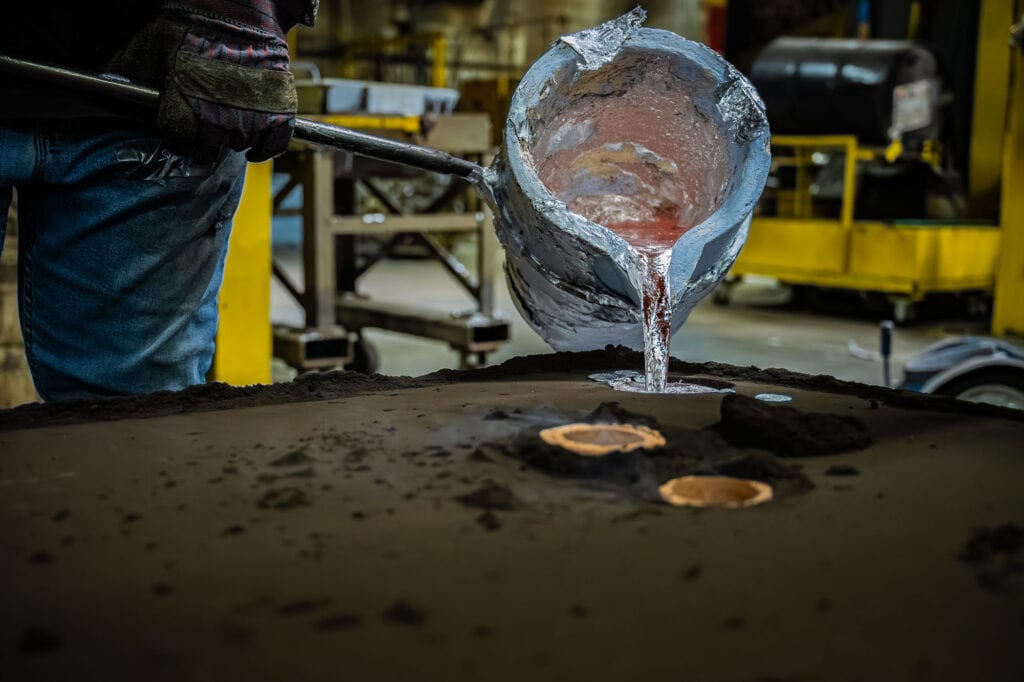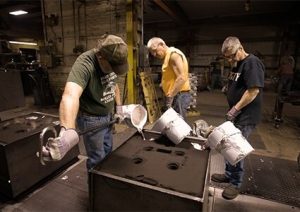The Relevance of Aluminum Foundries in Lasting Industrial Practices
Aluminum foundries are essential to lasting industrial techniques. They successfully reuse and create aluminum, a product understood for its environmentally friendly and light-weight homes. By applying sophisticated modern technologies and renewable resource, these foundries greatly lower power use and emissions. Additionally, their recycling capabilities save natural resources and foster a round economic climate. As the demand for lasting options expands, the function of aluminum foundries remains to progress, elevating important inquiries about their future impact.
The Role of Aluminum in Lasting Manufacturing
Although numerous products are used in contemporary manufacturing, aluminum stands out as a result of its one-of-a-kind buildings that add to sustainable techniques. Its lightweight nature lowers energy consumption during transport and application, significantly lowering carbon impacts across various industries. Aluminum's resistance to rust expands its lifespan, reducing the requirement for replacements and resource-intensive upkeep. On top of that, it is very recyclable, with the capacity to maintain its properties after multiple cycles, advertising a round economic climate. This recyclability minimizes the need for raw products, preserving natural deposits and power. Furthermore, aluminum can be generated with lower greenhouse gas emissions contrasted to other steels, specifically when sourced from recycled material. As sectors increasingly focus on sustainability, aluminum's flexibility and environment-friendly characteristics setting it as an essential material in attaining greener manufacturing processes. Its duty in minimizing environmental effect highlights the significance of aluminum in contemporary industrial methods, lining up with global sustainability objectives.
Power Effectiveness in Aluminum Foundries

Additionally, refining operational processes with automation and real-time tracking can further improve energy administration. Regular upkeep of devices assurances peak performance, while worker training on energy-saving practices cultivates a society of sustainability within the workforce.
Investments in renewable resource sources, such as solar or wind power, also add to lowering the carbon footprint of aluminum foundries. By prioritizing power efficiency, these facilities not only lower functional costs yet likewise play a critical function in cultivating a lasting commercial landscape, lining up with wider environmental objectives.
Recycling and Resource Conservation
Recycling and resource preservation play an important role in the sustainability techniques of aluminum foundries, matching power effectiveness campaigns. Aluminum is just one of the most recycled products internationally, with the reusing procedure requiring only 5% of the power required for main manufacturing. Foundries proactively gather scrap aluminum from numerous resources, including post-consumer items and producing waste, therefore reducing the demand for virgin product extraction. This method not only conserves all-natural sources yet additionally lessens greenhouse gas discharges related to mining and refining.
The closed-loop recycling system executed by numerous foundries assurances that aluminum components are recycled continuously without destruction of quality. This system boosts product efficiency and adds to a circular economy. By prioritizing recycling and resource preservation, aluminum foundries considerably mitigate their ecological influence while advertising sustainable commercial practices that benefit both the economy and society.

Innovations in Aluminum Production Processes
Advancements in aluminum production procedures are changing the sector, focusing on minimizing energy consumption and improving effectiveness. One significant technology is the fostering of advanced smelting strategies, such as inert anode innovation, which greatly decreases greenhouse gas exhausts while enhancing result quality. Furthermore, the combination of automation and artificial intelligence in production lines has structured operations, enabling for real-time tracking and adjustments that optimize resource use.
The development of brand-new alloys and composite products likewise improves the mechanical properties of aluminum while preserving its lightweight qualities. Developments in recycling methods, consisting of closed-loop systems, enable the recovery of materials with minimal waste. Additionally, the execution of renewable resource sources in aluminum smelting plants is coming to be increasingly common, lining up manufacturing with sustainability objectives. Collectively, these developments not just improve efficiency however additionally place the aluminum industry as a leader in lasting production techniques.

The Impact of Aluminum Foundries on Round Economy
Aluminum foundries play an important function in cultivating a circular economic climate by highlighting the value of material healing and reuse. By using recycled aluminum, foundries significantly reduce the need for virgin products, decreasing environmental impact and conserving power. The procedures utilized in aluminum foundries allow for the efficient improvement of scrap aluminum back into high-grade ingots, which can be repurposed for new items - Aluminum Castings. This technique not just lowers carbon discharges however likewise lowers waste in landfills, straightening with the principles of sustainability
Moreover, aluminum's intrinsic residential or commercial properties-- such as light-weight and resilience-- boost product long life, reducing the frequency of replacement. The combination of aluminum foundries within local economies advertises task production and supports lasting practices, as they frequently work together with sectors concentrated on recycling and source monitoring. In general, aluminum foundries contribute in progressing round economy efforts, confirming their worth in modern commercial practices.
Frequently Asked Concerns
Exactly How Do Aluminum Foundries Contribute to Work Production in Regional Communities?
Aluminum foundries add to task production in regional neighborhoods by supplying employment possibility throughout different skill levels, enhancing local economic situations with increased earnings, and cultivating workforce development, eventually sustaining lasting growth and community strength.
What Are the Environmental Influences of Aluminum Mining?
Aluminum mining significantly affects the setting via deforestation, habitat damage, and water air pollution. The extraction process usually brings about soil degradation and adds to greenhouse gas emissions, influencing regional ecosystems and areas reliant on natural sources.
Exactly how Does the Expense of Aluminum Compare to Other Metals?
Aluminum usually sets you back less than metals like copper and gold, yet even more than iron and steel (Metal Castings). Its cost varies based upon market demand, manufacturing prices, and worldwide financial conditions, influencing different sectors and applications
What Certifications Should Consumers Try To Find in Sustainable Aluminum Products?
Consumers ought to seek accreditations such as the Aluminum Stewardship Effort (ASI) qualification, ISO 14001 for ecological administration, and the Worldwide Recycle Criterion (GRS) to ensure sustainability in aluminum items, advertising accountable sourcing and ecological stewardship.
Just How Can Services Examine the Sustainability of Their Aluminum Vendors?
Businesses can assess the sustainability of click here aluminum suppliers by reviewing qualifications, bookkeeping methods, assessing energy usage, and making sure adherence to environmental guidelines. Collaborating with vendors who focus on environment-friendly processes is essential for lasting operations.
As aluminum foundries endeavor to improve their sustainability efforts, energy performance emerges as a vital focus location. Investments in sustainable energy sources, such as solar or wind power, also add to decreasing the carbon impact of aluminum foundries. Recycling and resource conservation play a vital role in the sustainability practices of aluminum foundries, enhancing power performance initiatives. By making use of recycled aluminum, foundries greatly lower the demand for virgin materials, minimizing environmental influence and preserving energy. The processes used in aluminum foundries allow for the efficient improvement of scrap aluminum back into top notch ingots, which can be repurposed for brand-new products.